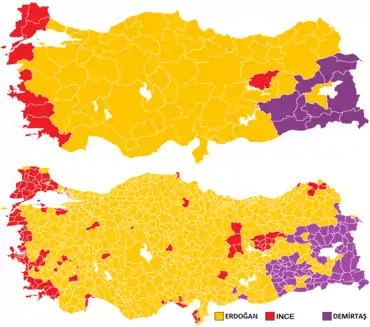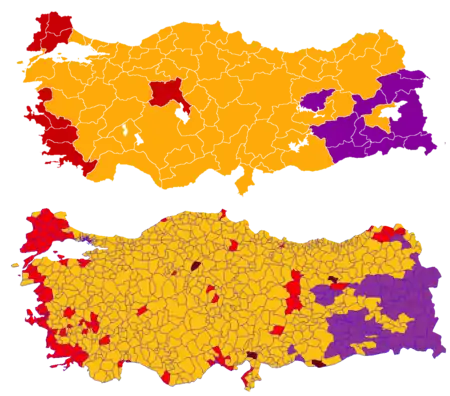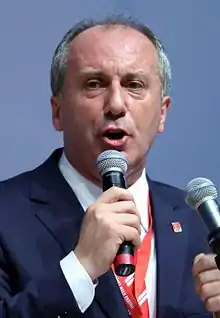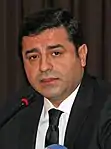2018 Turkish general election
General elections were held throughout Turkey on 24 June 2018. Originally due on 3 November 2019, President Recep Tayyip Erdoğan announced on 18 April 2018 that the vote was being brought forward. Presidential elections were held to elect the President of Turkey using a two-round system. Parliamentary elections took place to elect 600 Members of Parliament to the Grand National Assembly of Turkey.
| This article is part of a series on the Turkish general election, 2018 | |||||
|---|---|---|---|---|---|
| Sunday, 24 June 2018
Opinion polling · Electoral system | |||||
Party | Candidate | % | |||
| AKP | Recep Tayyip Erdoğan | 52.59 | |||
| CHP | Muharrem İnce | 30.64 | |||
| HDP | Selahattin Demirtaş | 8.40 | |||
| İYİ | Meral Akşener | 7.29 | |||
| SP | Temel Karamollaoğlu | 0.89 | |||
| VP | Doğu Perinçek | 0.20 | |||
 Results by province Erdoğan (63) İnce (8) Demirtaş (10) | |||||
| All 600 seats in the Grand National Assembly Outgoing members · Members elected  | |||||
Alliance/Party | Votes | % | MPs | ||
| People's | 26,904,024 | 53.66 | 344 | ||
| Nation | 17,019,808 | 33.95 | 189 | ||
| HDP | 5,867,302 | 11.70 | 67 | ||
| Others | 346,041 | 0.69 | 0 | ||
Total | 50,137,175 | 100.00 | 600 | ||
 Winners by electoral district (top) and provincial district (bottom): AKP CHP HDP MHP | |||||
Source: Supreme Electoral Council | |||||
| ← Nov 2015 election | → 2023 | ||||
 |
|---|
| This article is part of a series on the politics and government of Turkey |
|
|
Background
2017 constitutional referendum
The ruling Justice and Development Party (AKP) and Erdoğan had long supported a policy of turning Turkey into an executive presidency, replacing the existing parliamentary system of government.[1] With the support of the Nationalist Movement Party (MHP), the government was able to enact a referendum in Parliament, with the vote being set for 16 April 2017.[2]
The proposed constitutional changes would see parliamentary and presidential elections taking place on the same day every five years, with the initial vote being set for 3 November 2019. The number of seats in the Grand National Assembly was to be increased from 550 to 600, although the legislative powers of Parliament would be greatly reduced. Crucially, the office of the President of Turkey would be given powers to rule by decree, becoming both the country's head of state and head of government.[3] Supporters of the changes claimed that the new system would make the system of government more efficient, while critics claimed that it would place too much power in the hands of the president and effectively render parliament powerless.[4][5]
The constitutional changes were approved by a 51-49% margin, according to official results. However, a last-minute change in the election rules by the Supreme Electoral Council (YSK) during the vote allowed unverified ballots to be accommodated into the count, which the opposition alleges added 1.5 million extra ballot papers.[6] The political opposition decried the move to be illegal and were backed by several overseas observer organisations, which claimed that the vote did not meet international standards.[7] However, subsequent legal challenges were all unsuccessful. Thus, the government began enacting 'compliance laws' to prepare for the new executive presidential system of government, which would be fully implemented following the general election scheduled for 3 November 2019.[8]
Early election
Despite over two years to go before the next presidential and parliamentary elections, many observers alleged that the government was preparing for an early vote soon after the 2017 referendum.[9][10] This was, observers claimed, to speed up the implementation of the executive presidential system and also to prevent the popularity of new opposition movements from reducing support for the government.[11] In October 2017, opposition leader Kemal Kılıçdaroğlu called for early elections, although there was no official response to this.[12] Meral Akşener, the leader of the newly formed İyi Party, alleged that the government were planning an early vote for Sunday 15 July 2018, the second anniversary of the failed 2016 coup d'état attempt.[13] The party held its first ordinary congress on 10 December 2017 and first extraordinary congress on 1 April 2018 in order to be eligible to contest a possible snap election. Despite months of speculation, the government repeatedly claimed that it was in favour of holding elections when they were due, denying that an early vote would take place.[14]
On 17 April 2018, Devlet Bahçeli, the leader of the Nationalist Movement Party, called for early elections for the 26th of August.[15] Bahçeli had previously announced that they would support a re-election bid of the incumbent president, Recep Tayyip Erdoğan.[16] The Justice and Development Party (AKP), led by Erdoğan, had recently announced an electoral alliance with the MHP called the People's Alliance.[17] Following his call for early elections, Bahçeli met Erdoğan a day later on 18 April. Erdoğan subsequently announced that his party agreed with Bahçeli that an early election was needed to solve the ongoing 'political and economic uncertainty'. He therefore announced that early elections would take place on 24 June 2018.[18]
Presidential election
Candidates
| Official list of presidential candidates in order of appearance on the ballot paper[19] | |||||
|---|---|---|---|---|---|
| 1 | 2 | 3 | 4 | 5 | 6 |
 |
.jpg.webp) |
.jpg.webp) |
 |
.jpg.webp) |
.jpg.webp) |
| Muharrem İnce | Meral Akşener | Recep Tayyip Erdoğan (incumbent) | Selahattin Demirtaş | Temel Karamollaoğlu | Doğu Perinçek |
| CHP (Nation Alliance) |
İYİ (Nation Alliance) |
AKP (People's Alliance) |
HDP (No alliance) |
Saadet (Nation Alliance) |
Vatan (No alliance) |
| View campaign | View campaign | View campaign | View campaign | View campaign | View campaign |
Results
| Candidate | Party | Votes | |||
|---|---|---|---|---|---|
| # | % | ± | |||
| Recep Tayyip Erdoğan | Justice and Development Party (AKP) | 26,330,823 | 52.59 | +0.80 | |
| Muharrem İnce | Republican People's Party (CHP) | 15,340,321 | 30.64 | New | |
| Selahattin Demirtaş | Peoples' Democratic Party (HDP) | 4,205,794 | 8.40 | −1.36 | |
| Meral Akşener | İyi Party (İYİ) | 3,649,030 | 7.29 | New | |
| Temel Karamollaoğlu | Felicity Party (SP) | 443,704 | 0.89 | New | |
| Doğu Perinçek | Patriotic Party (VP) | 98,955 | 0.20 | New | |
| Invalid/blank votes | 1,129,275 | – | – | ||
| Total | 51,188,524 | 100.00 | – | ||
| Registered voters/turnout | 59,354,840 | 86.24 | +12.11 | ||
| Source: Hürriyet | |||||
Parliamentary election
Parties contesting the election
| Ballot # | Coalition | Party | Ideology | Leader | |||
|---|---|---|---|---|---|---|---|
| 1 | People's Alliance | AK Parti | Justice and Development Party Adalet ve Kalkınma Partisi |
National conservatism Neo-Ottomanism |
Recep Tayyip Erdoğan | ||
| 2 | MHP | Nationalist Movement Party Milliyetçi Hareket Partisi |
Turkish ultranationalism Pan-Turkism |
Devlet Bahçeli | |||
| 3 | None | HÜDAPAR | Free Cause Party Hür Dava Partisi |
Pan-Islamism | Mehmet Yavuz | ||
| 4 | VP | Patriotic Party Vatan Partisi |
Scientific socialism Eurasianism |
Doğu Perinçek | |||
| 5 | HDP | Peoples' Democratic Party Halkların Demokratik Partisi |
Democratic socialism Kurdish minority rights |
Pervin Buldan Sezai Temelli | |||
| 6 | Nation Alliance | CHP | Republican People's Party Cumhuriyet Halk Partisi |
Kemalism Social democracy |
Kemal Kılıçdaroğlu | ||
| 7 | SP | Felicity Party Saadet Partisi |
Millî Görüş | Temel Karamollaoğlu | |||
| 8 | İYİ Parti | İyi Party İyi Parti |
Liberal conservatism Pro-Europeanism |
Meral Akşener | |||
Results
 | |||||||||
|---|---|---|---|---|---|---|---|---|---|
| Alliance | Party | Votes | Seats | ||||||
| # | % | ± | # | ± | % | ||||
| People's Alliance Cumhur İttifakı | Justice and Development Party* Adalet ve Kalkınma Partisi | 21,335,579 | 42.56 | -6.94 | 295 | -22 | 49.17 | ||
| Nationalist Movement Party Milliyetçi Hareket Partisi | 5,564,517 | 11.10 | -0.80 | 49 | +9 | 8.17 | |||
| People's Alliance total | 26,900,096 | 53.66 | -7.74 | 344 | -13 | 57.33 | |||
| Nation Alliance Millet İttifakı | Republican People's Party* Cumhuriyet Halk Partisi | 11,348,899 | 22.64 | -2.68 | 146 | +12 | 24.33 | ||
| İyi Party* İyi Parti | 4,990,710 | 9.96 | New | 43 | New | 7.17 | |||
| Felicity Party* Saadet Partisi | 673,731 | 1.34 | +0.66 | 0 | ±0 | 0.00 | |||
| Nation Alliance total | 17,013,340 | 33.94 | +7.94 | 189 | +55 | 31.50 | |||
| Peoples' Democratic Party Halkların Demokratik Partisi | 5,866,309 | 11.70 | +0.94 | 67 | +8 | 11.17 | |||
| Free Cause Party Hür Dava Partisi | 157,612 | 0.31 | +0.31 | 0 | ±0 | 0.00 | |||
| Patriotic Party Vatan Partisi | 117,779 | 0.23 | -0.02 | 0 | ±0 | 0.00 | |||
| Other Diğer | 75,283 | 0.15 | -1.44 | 0 | ±0 | 0.00 | |||
| Invalid/blank votes | 1,053,310 | – | – | – | – | – | |||
| Total | 51,183,729 | 100.00 | – | 600 | +50 | 100.00 | |||
| Registered voters/turnout | 59,354,840 | 86.23 | +1.05 | – | – | – | |||
| Source: Anadolu Ajansı | |||||||||
| *Notes: Two members of the Felicity Party were elected on the Republican People's Party list, one member of the Democrat Party was elected on the İyi Party list, and one member of the Great Union Party was elected on the Justice and Development Party list. | |||||||||
| 295 | 49 | 146 | 43 | 67 |
| AKP | MHP | CHP | İYİ | HDP |
Controversies
The election process was overshadowed many multiple allegations of violations of its integrity. Prominent among them was the allegation of widespread ballot stuffing for the benefit of AKP and MHP parties in Turkey's east, in particular in Şanlıurfa province.[20]
See also
References
- "AKP'den başkanlık açıklaması: Nisan ayında referanduma". www.birgun.net.
- "YSK Başkanı açıkladı: Referandum 16 Nisanda".
- "Anayasa Değişikliği Teklifi'nin Karşılaştırmalı ve Açıklamalı Metni". TÜRKİYE BAROLAR BİRLİĞİ - ANAYASA DEĞİŞİKLİĞİ TEKLİFİ'NİN KARŞILAŞTIRMALI VE AÇIKLAMALI METNİ.
- "Büyük ve güçlü Türkiye'ye "evet'".
- "CHP 10 MADDEDE ANLATTI: NEDEN HAYIR?". Archived from the original on 2017-03-12. Retrieved 2018-04-19.
- Sanchez, Raf; Yüksekkaş, Burhan (16 April 2017). "Erdogan claims victory in Turkish referendum but result swiftly challenged by opposition" – via www.telegraph.co.uk.
- "AKPM referandum raporunu açıkladı 'YSK kararı yasaya aykırı'".
- "Uyum Yasaları Neler Getiriyor?".
- "Ankara'da erken seçim iddiaları..."
- Sayın, Ayşe (19 April 2018). "2018'de Türkiye: Erken seçim mi, seçime hazırlık yılı mı?" – via BBC.com.
- Mynet. "Kulislerde dolaşan erken seçim ve Afrin iddiası Ankara'yı hareketlendirdi".
- "Kılıçdaroğlu erken seçim dedi".
- "Meral Akşener'den Erken Seçim Tarihi: 15 Temmuz 2018".
- "Hükümetten en net erken seçim yalanlaması: Erdoğan 'Yok' diyor, o kadar - Diken". 6 March 2018.
- "Devlet Bahçeli neden 26 Ağustos tarihini seçti?". Retrieved 24 June 2018.
- "Bahçeli: Erdoğan'ı destekliyoruz". Retrieved 24 June 2018.
- Gazetesi, Aydınlık. "Devlet Bahçeli: Cumhur ittifakı 2019'da tarih yazacak - Aydınlık".
- "Erdoğan açıkladı... Erken seçim tarihi belli oldu".
- "Pusuladaki sıralama belli oldu: İnce ilk sırada". Cumhuriyet. 2018-05-14. Archived from the original on 2018-05-14. Retrieved 2018-05-14.
- "The element of surprise in Turkey's election results". Ahval. 1 August 2018.
External links
![]() Media related to Turkish general election, 2018 at Wikimedia Commons
Media related to Turkish general election, 2018 at Wikimedia Commons
- Marc Pierini (5 June 2018). "Three Scenarios for Turkey's Elections". Carnegie Europe.